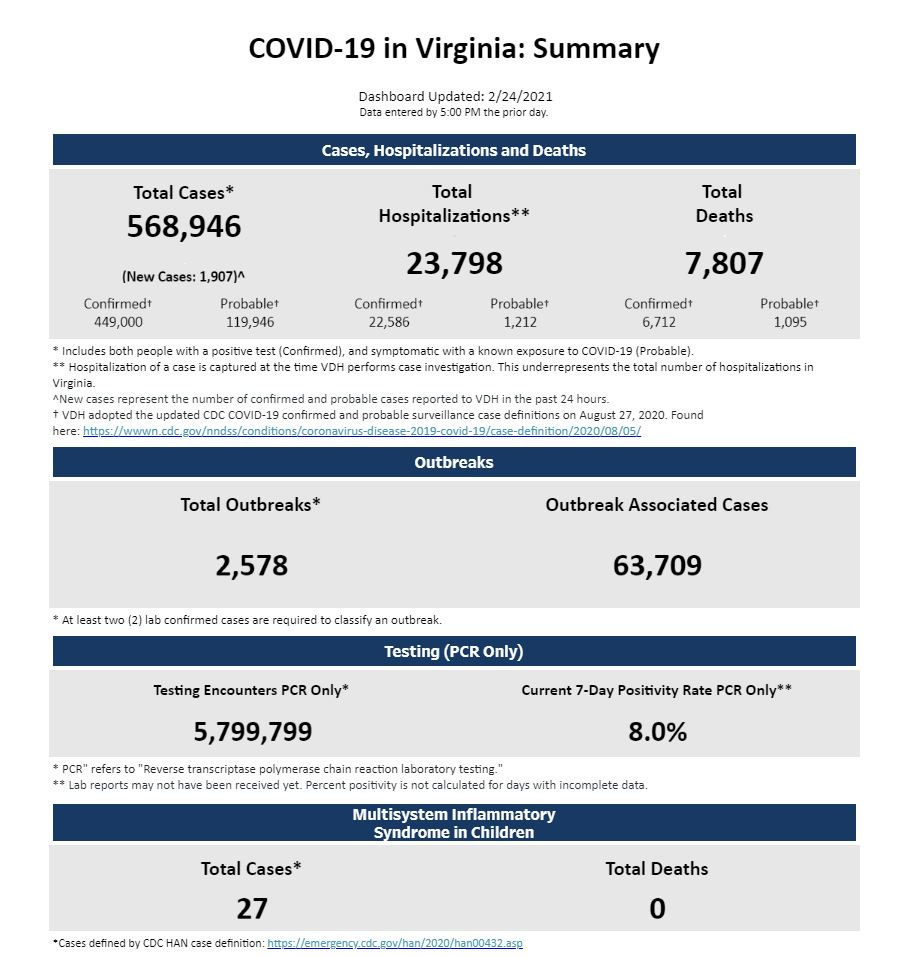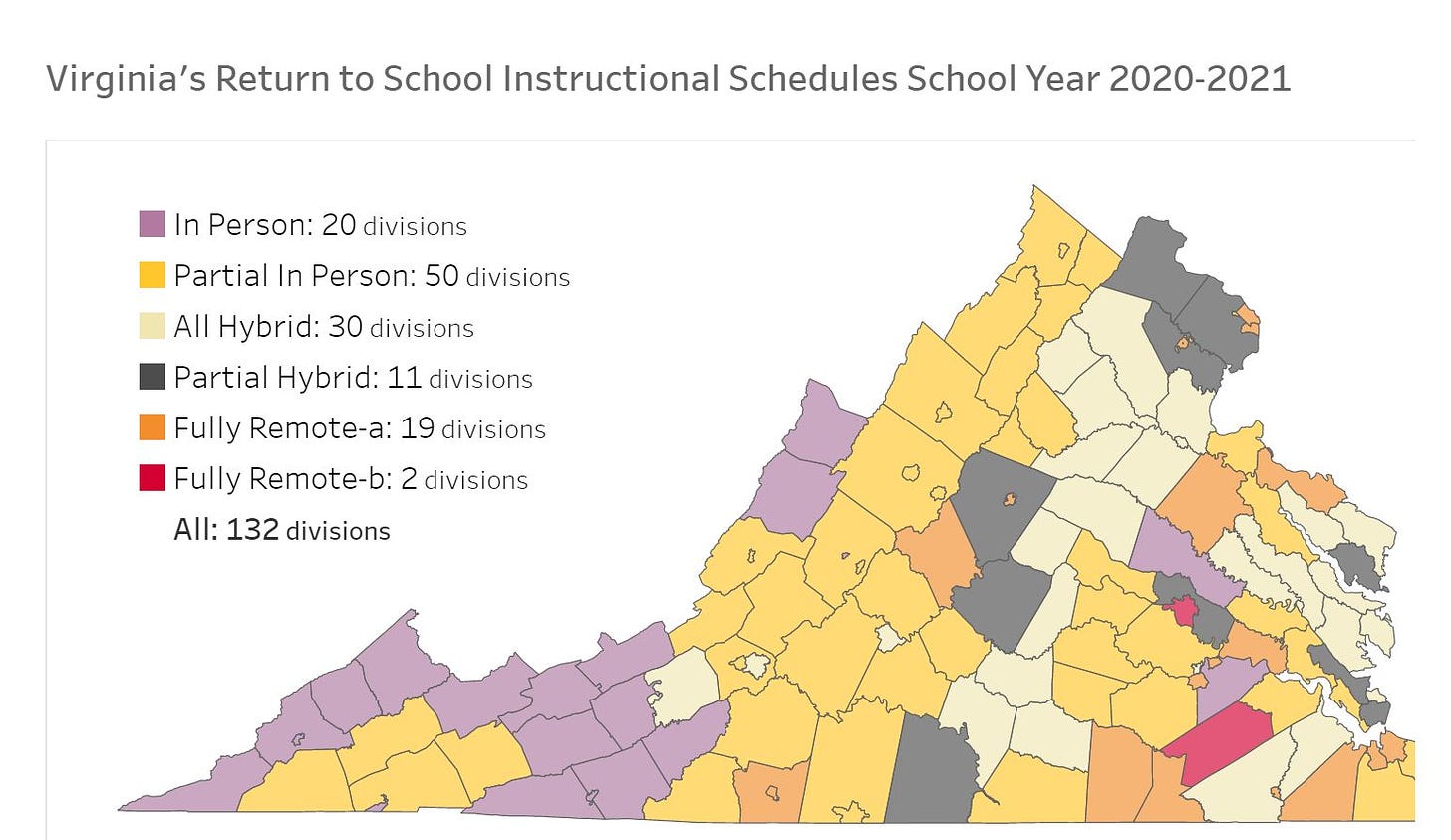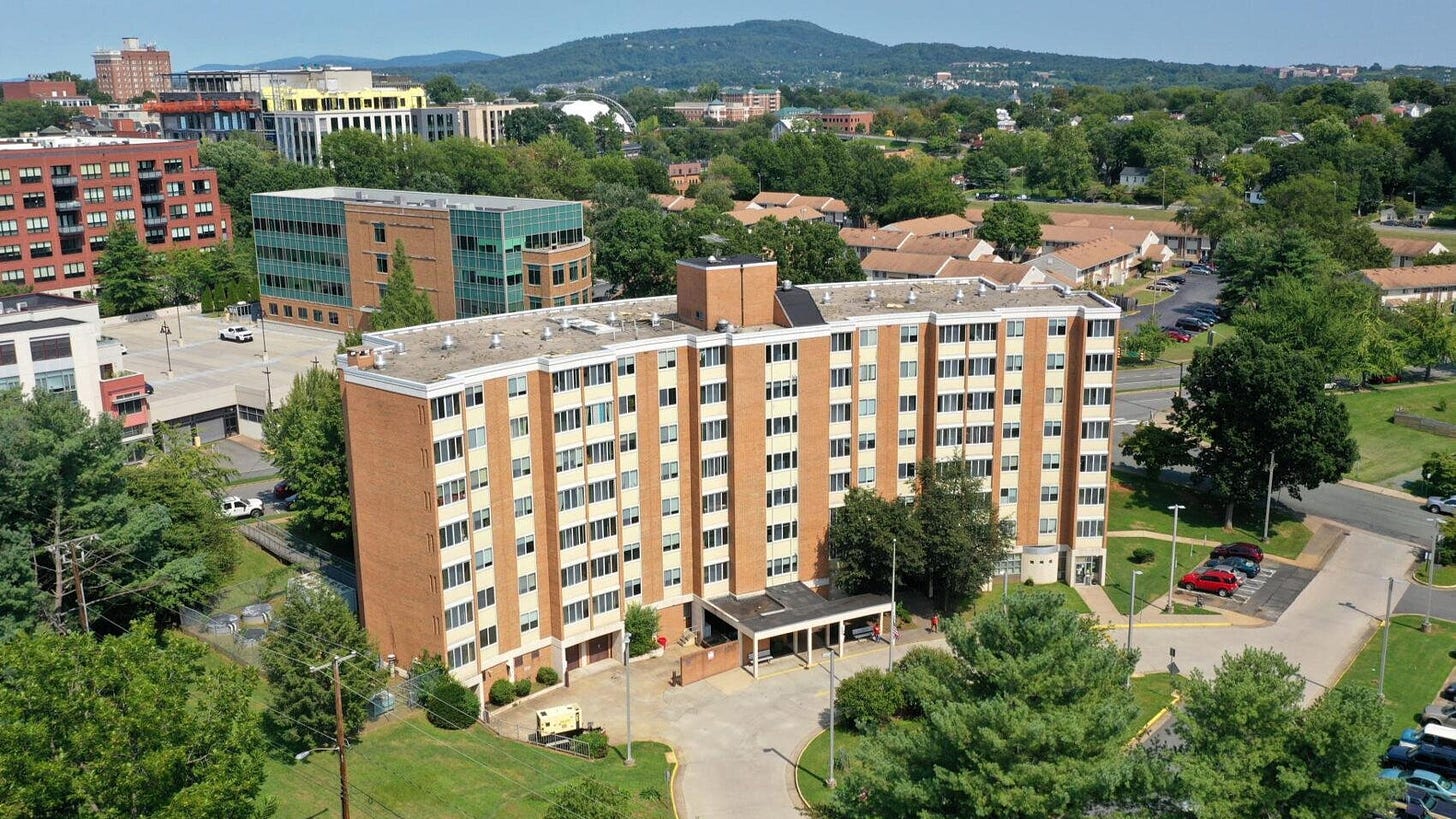Today's Patreon-fueled shout-out is for the Plant Northern Piedmont Natives Campaign, an initiative that wants you to grow native plants in yards, farms, public spaces and gardens in the northern Piedmont. Native plants provide habitat, food sources for wildlife, ecosystem resiliency in the face of climate change, and clean water. Start at the Plant Northern Piedmont Natives Facebook page and tell them Lonnie Murray sent you!
On today’s show:
CRHA gets an update on two upcoming construction projects
Batesville residents have the chance to ask questions about a 60-acre solar project
Virginia General Assembly is considering legislation to require schools return to in-person education
Let’s begin with a quick look at COVID numbers today.The local surge continues while the statewide recedes. The Virginia Department of Health reports 1,907 new cases today, which is just one number off the statewide 7-day average of 1,908. 102 of those new cases are in the Blue Ridge District with 80 from Albemarle and ten from Albemarle. The University of Virginia is now reporting 853 active cases on its COVID tracker.

We need to talk a little about deaths. After over a week without any fatalities, thirteen new cases have been reported in Blue Ridge Health District for the past four days. That doesn’t mean the individuals died yesterday, as the Virginia Department of Health recommends looking at fatalities on the day they occured. Statewide the death count had been going up sharply as a backlog of death certificate data is entered. The total is 7,807 in Virginia as of today.
One alarming metric change today is a sudden increase of cases of Multisystem Inflammatory Syndrome in Children from 18 on Monday to 25 yesterday to 27 today. Read coverage on that topic in the Henrico Citizen.
Charlottesville is moving forward with a plan to return students to classrooms on March 8. Albemarle County goes from Stage 3 to Stage 4 on March 15. A bill that would require school systems to make in-person instruction the default form of education has passed a Virginia House of Delegates panel. SB1303 was approved by the 17-3 by the House Education Committee on Monday. Here’s the sponsor, Senator Siobhan Dunnavunt (R-12).
“It requires each School Board to offer in-person education for the minimal number of hours required annually to each person in K-12 schools [and] to follow the mitigation guidelines of the CDC to do that in a safe way,” Dunnavant said. Schools would be directed to work with local health departments to ensure anyone who contracts a case would be quarantined.
Dunnavunt said opening schools will help some people get back to work.
“We are seeing that working mothers have the highest unemployment rate and after all of our efforts in equality in employment, we have had a huge setback with untold jeopardy for moms going forward because the infrastructure of school is a necessary component of the stability of the family,” Dunnavunt said.
The bill under consideration is a substituted amended to allow some students to continue to attend school virtually.
“Folks are able to learn virtually if they have medical reasons they feel are important or if their community is just a bit more wary of going back,” said Delegate Schuyler VanValkenburg (D-72).
The legislation would go into effect July 1. An emergency clause requiring schools to open immediately was removed before it passed the Senate. For a snapshot of what divisions are doing what at the moment, consult the Virginia Department of Education map.

While we’re on the topic of legislation, a bill to create a passenger rail authority for the New River Valley has passed the full General Assembly. This year’s recommended Smart Scale projects include $50 million to expand passenger rail to Christiansburg. More on that in Amy Freidenberger’s story in the Roanoke Times.
Finally in brief COVID news, the Center at Belvedere has announced it will reopen its doors on March 15. The community space off of Rio Road closed their doors in late January amid a surge in cases. An email from Center executive director Peter Thompson said vigilance will still be required.
“Not everyone has received a vaccination, and uncertainty surrounding coronavirus variants remains,” Thompson wrote. “To safeguard against complacency, we are adding a few new protocols to ensure the safest possible environment in which to enjoy our many programs.”
*
The Charlottesville Redevelopment and Housing Authority’s Board of Commissioners held their final meeting before groundbreaking will take place for the first new public housing units to be built in a generation.
Jay Kessler has been working as the project manager on behalf of the CRHA in a position known as “owner’s representative.” Riverbend Development is the private partner under an LLC called the Affordable Housing Group.
“And in this case, the owner is different than my normal clients because it really is AHG, it’s CRHA, and it’s PHAR,” Kessler said. “Owners have a significant role to play in the success of their design and construction projects. I bring a 35-year construction background.”
Kessler said he had no prior experience working on projects that trigger regulations from the U.S. Department of Housing and Urban Development. Kessler said actual work at South First Street began on February 8.
“Right now they are working on getting erosion and sediment control set up, getting security fencing up, getting signs and banners up so people know what’s going on if they drive by on if they are not familiar with it,” Kessler said.
The first building pad will be ready in April, followed by significant construction activities. The work is expected to be complete in June 2022.
Kessler said the Crescent Halls renovations are not as close to construction and negotiations are still underway for a contract price with GMH Construction. He said he hoped the project could close by the first week of March with construction beginning in mid-April and concluding toward the the end of 2022.
“We had hoped to be there at the end of last week but didn’t quite get to where we have a final contract in place,” Kessler said. “Their plan is to start on the re-roofing of the building once the 8th floor is vacant so that we don’t have too much noise for residents living there.”
Kessler said the construction schedule depended on enough residents volunteering to be temporarily relocated to other units within the building and that CRHA had enough verbal commitments to proceed.
“There will be challenges with it being occupied during the renovations but that’s had a lot of discussion, a lot of planning,” Kessler said.
The cost of both projects have increased due to a scarcity of building materials, which has resulted in an increase in costs.
“That’s definitely an issue on South First Street, but I know our contractor Breeden Construction factored in the cost risk into their contract so if the market changes, they are at that risk, not us, not the owner,” Kessler said.
The occasion was noted by Joy Johnson of the Public Housing Association of Residents, who recently won the Dolbeare Lifetime Service Award from the National Low-Income Housing Coalition for her work in laying the groundwork for affordable housing reform in the city.
“The work that PHAR and myself has done, and to see those 63 units getting ready to go up and to see Crescent Halls getting ready…. ...to be able to see that to me I am just very thankful,” Johnson said.
The CRHA will have a work session on the agency’s capital budget on Thursday. It’s been postponed twice due to recent inclement weather.

Last night, a community meeting was held for a special use permit for a 60-acre utility-scale solar facility near Batesville. Sun Tribe Solar is applying for the 8-megawatt project on behalf of the Central Virginia Electric Cooperative, which purchased the property last year. Supervisors updated the zoning code to allow such facilities with a special use permit.
Bobby Jocz is a permitting lead with Sun Tribe Solar.
“Once the life of this facility is complete, the site will be restored to its original condition,” Jocz said.
Neighbors had the opportunity to ask questions about the project. Paul Miller is a resident of Craigs Store Road, where the site would be located.
“I’m in general in favor of solar development, but I’m not so sure about this particular location when I look at opportunities for development on top of buildings in urban areas,” Miller said.
Miller asked if there could be opportunities for sheep to be able to graze on the property. Miller and others also expressed concern about outdoor lighting at the facility given concerns about preserving the dark sky.
Mark Tueting also lives on Craigs Store Road and he is concerned on the visual impacts for the years before vegetated landscaping grows in. He also had a question about whether this would be a “substantial detriment”
“I’m excited solar and they’ve been really good to work with and they’ve talked about letting my son keep running his sheep there, but I have to worry about property values, too,” Tueting said. “I think most of us who live in the area said we wanted to live in a rural area. We know we probably wouldn’t have bought here if there was a power plant next door.”
Bill Fritz with Albemarle’s Community Development Department said there is a high bar to stop a project based on the claims for “substantial detriment.”
“Substantial detriment that planners use is that the impact is such a severe impact that it denies the right to use another property,” Fritz said. “For example, if I have a use that generates a massive amount of odor, and I am next to a restaurant, I have effectively made it so that restaurant cannot operate. That would be a substantial detriment. The mere fact it can be seen would not be a substantial detriment.”
However, Fritz said there are three other factors staff will review while it conducts its review.
“It may not be a substantial detriment but it might be inconsistent with the character of the area,” Fritz said. The project will next go to the Planning Commission for a recommendation followed by the Board of Supervisors.















Share this post